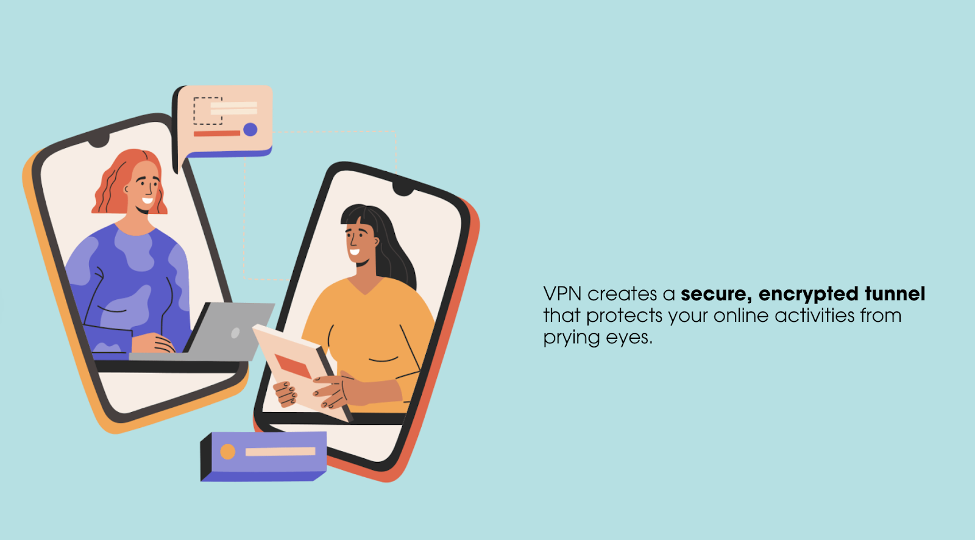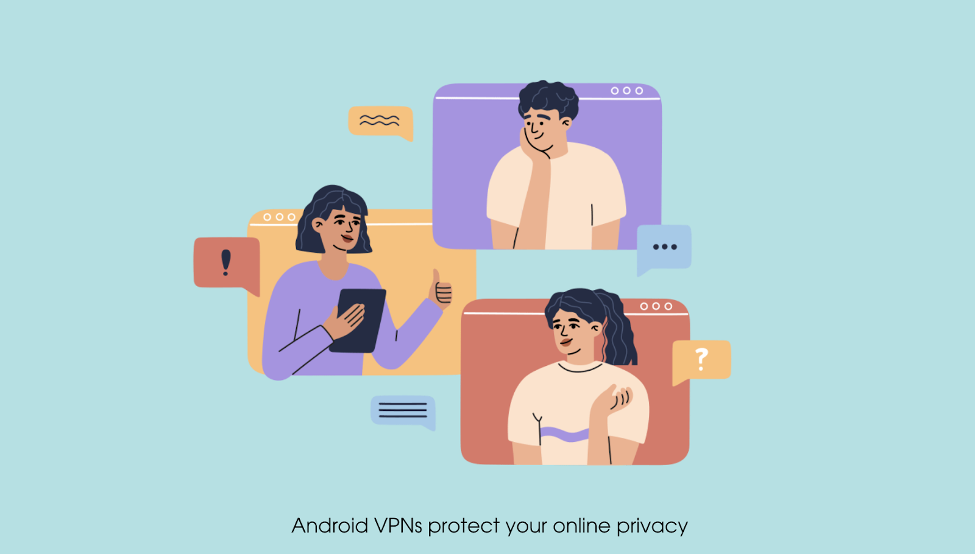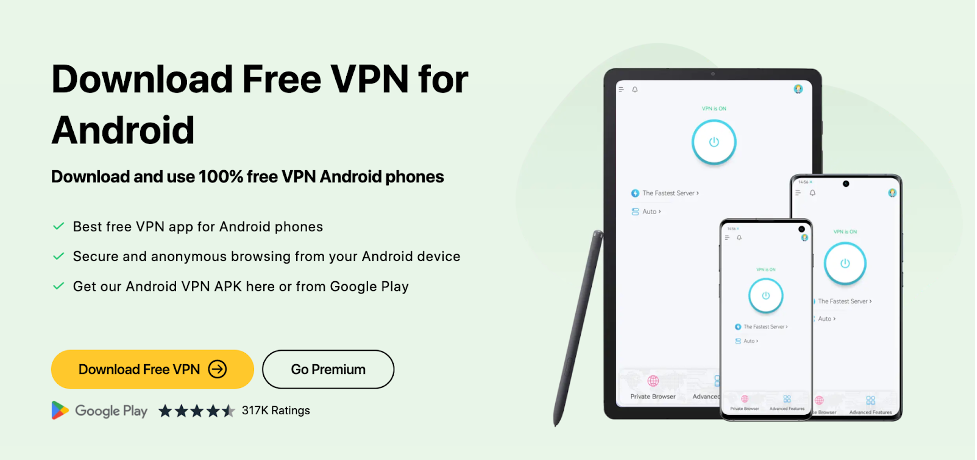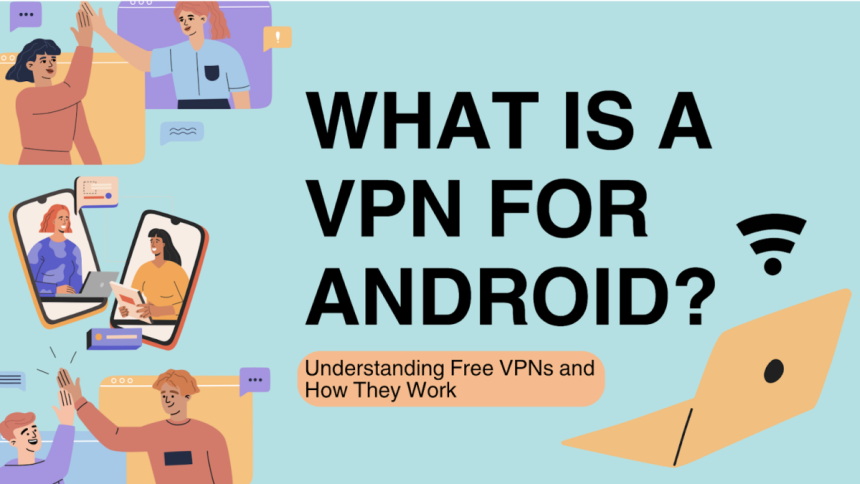Imagine you’re in a crowded coffee shop, sipping your latte while scrolling through your Android phone. You’re checking emails, shopping online, maybe even logging into your bank account. But here’s the catch—without protection, it’s like shouting your private information to everyone in the room. Scary, right?
Enter the VPN (Virtual Private Network)—your online invisibility cloak. In this article, we’ll dive into what a VPN is, how it works on Android devices, and whether free VPNs are worth your time. By the end, you’ll know exactly how to shield your online activities with confidence.
What Is a VPN for Android?
Think of a VPN for Android as your secret agent for the internet. Normally, when you connect to a website, your Android device sends information out in the open, making it easy for hackers, advertisers, or even your internet provider to snoop on you.

But when you use a VPN, it’s like slipping your data into a locked briefcase before sending it. The VPN creates a secure, encrypted tunnel that protects your online activities from prying eyes. And the best part? It makes it look like you’re browsing from somewhere else entirely.
Example:
Without a VPN, a website can see your real location (e.g., Miami, Florida). But with a VPN, it thinks you’re in London, Paris, or wherever the VPN server is located.
Why It Matters:
A VPN gives you privacy, security, and freedom. It’s especially useful for Android users who rely on their phones for everything from banking to streaming.
How Does a VPN Work on Android?
Using a VPN on your Android phone might feel like magic, but there’s a lot of clever technology working behind the scenes. Let’s break it down into three key steps—with some fun analogies to make it crystal clear.
1. Encryption: The Secret Code
When you connect to a VPN, all the data leaving your Android device—whether it’s your browsing history, email content, or payment information—is encrypted. This means it’s scrambled into a format that only your VPN server can decode.
Analogy:
Imagine you’re sending a postcard without a VPN. Anyone handling it (your ISP, hackers, or even curious Wi-Fi snoopers) can read your message. Now picture writing the message in a secret code that only the recipient understands. Even if someone intercepts the postcard, all they’ll see is gibberish.
What It Does for You:
- Shields sensitive information, like passwords and credit card details, from hackers.
- Protects your browsing habits from being tracked by advertisers or ISPs.
Example:
If you’re using public Wi-Fi at a coffee shop, a hacker sitting nearby could intercept your unencrypted data. With a VPN, even if they grab it, they won’t be able to make sense of the encrypted data—it’s like trying to read a shredded document.
2. Secure Tunneling: Your Private Highway
Once your data is encrypted, it’s sent through a secure “tunnel” to the VPN server. This tunnel keeps your data hidden from prying eyes as it travels across the internet.
Analogy:
Think of your normal internet connection like a busy highway. Everyone can see your car (your data), your license plate (your IP address), and your destination (the websites you visit). A VPN acts like an underground tunnel just for you—no one knows who’s driving, where you’re going, or what you’re carrying.
What It Does for You:
- Prevents ISPs from monitoring your online activity or throttling your speeds.
- Stops hackers from intercepting your data during transit.
Example:
Imagine you’re streaming a movie on your Android phone, and your ISP notices you’re using a lot of bandwidth. Without a VPN, they might slow down your connection (throttling). With a VPN’s encrypted tunnel, your ISP can’t see what you’re doing, so throttling becomes nearly impossible.
3. IP Masking: The Disguise
Your real IP address—essentially your device’s “digital fingerprint”—is replaced with the IP address of the VPN server. This makes it look like you’re browsing from the VPN server’s location instead of your actual location.
Analogy:
It’s like wearing a mask at a masquerade ball. Instead of your real face, everyone only sees the mask you’ve chosen. Similarly, websites and apps see the VPN server’s IP address, not your real one. This keeps your identity and location hidden.
What It Does for You:
- Lets you access content restricted to specific regions (e.g., Netflix U.S. or BBC iPlayer).
- Keeps your physical location private, adding an extra layer of security.
Example:
If you’re in Germany but want to watch a U.S.-exclusive Netflix series, you can connect to a U.S. VPN server. To Netflix, it looks like you’re streaming from the U.S., giving you access to that library.
4. What It Looks Like on Android
Setting up and using a VPN on Android is as easy as it gets. Here’s what typically happens:
- Download the VPN App: Most VPNs for Android have simple apps available in the Google Play Store.
- One-Tap Connection: Open the app, choose a server, and tap “Connect.” The VPN takes care of the rest.
- Runs in the Background: Once connected, the VPN works silently in the background, protecting all apps that use the internet—whether it’s your browser, streaming apps, or even games.
Pro Tip: Many VPN apps have a “Quick Connect” button that automatically selects the fastest server near you for a hassle-free setup.
Putting It All Together
Using a VPN on Android is like combining three layers of protection:
- Encryption: Keeps your data secure, like locking it in a vault.
- Secure Tunneling: Hides your data in a private, protected pathway.
- IP Masking: Disguises your digital identity to keep you anonymous.
These three steps work seamlessly to ensure that your Android device stays secure, private, and unrestricted, no matter where you are.
Why Do Android Users Need a VPN?

Here are the top reasons Android users turn to VPNs:
- Privacy: Stop advertisers, ISPs, and hackers from tracking your online activities.
- Security: Encrypt connections, especially on public Wi-Fi at airports, cafes, or hotels.
- Access Geo-Restricted Content: Watch Netflix libraries, YouTube videos, or websites blocked in your region.
- Bypass Censorship: Access apps or sites restricted in certain countries.
- Avoid Bandwidth Throttling: Prevent ISPs from slowing down your connection during heavy usage.
Are Free VPNs for Android Worth It?
The Good:
- Cost: They’re free! Perfect for casual users or those on a budget.
- Accessibility: Easy to download and set up.
- Light Usage: Ideal for basic browsing or bypassing small restrictions.
The Not-So-Good:
- Limited Features: Free VPNs often come with data caps, slow speeds, or limited servers.
- Privacy Risks: Some free VPNs log and sell user data.
- Intrusive Ads: Many free apps display ads to cover their costs.
Pro Tip: Choose a reputable free VPN for Android to minimize risks—avoid sketchy apps with vague privacy policies.
Recommended Free VPNs for Android

1. ProtonVPN (Free Version)
- Why It’s Great: Unlimited data and strong privacy features.
- Best For: Privacy-conscious users.
2. Windscribe (Free Plan)
- Why It’s Great: Generous 10GB/month data allowance and an intuitive interface.
- Best For: Light streaming and browsing.
3. X-VPN (Free Version)
- Why It’s Great: Unlimited bandwidth with a user-friendly interface.
- Best For: Casual users seeking simplicity.
4. Hide.me (Free Tier)
- Why It’s Great: Ad-free experience with 10GB/month of free data.
- Best For: Light usage without distractions.
How to Set Up a Free VPN on Android
Follow these easy steps to get started:
- Open the Google Play Store and search for the VPN app of your choice.
- Download and install the app.
- Open the app and create an account (if required).
- Select a server location and tap Connect.
- Use an IP lookup tool to confirm your IP address has changed.
Pro Tip: Enable the auto-connect feature in the app for continuous protection.
FAQs About Free VPNs for Android
1. Are free VPNs safe for Android?
- Reputable free VPNs like ProtonVPN and Windscribe are generally safe, but avoid apps with unclear privacy policies.
2. Can I stream with a free VPN?
- Yes, but expect slower speeds or limited server access with free options.
3. Do free VPNs slow down my internet?
- Free VPNs may reduce speeds, but top options minimize this impact.
4. Are there alternatives to free VPNs?
- Paid VPNs offer faster speeds, stronger security, and better features for as little as $3/month.
Conclusion
A VPN for Android is like a digital bodyguard—it encrypts your data, hides your identity, and opens doors to content you wouldn’t otherwise access. While free VPNs have limitations, they’re a great starting point for casual users.
So why wait? Try one of the recommended free VPNs today and experience the freedom, privacy, and security that come with using a VPN on your Android device.
Lynn Martelli is an editor at Readability. She received her MFA in Creative Writing from Antioch University and has worked as an editor for over 10 years. Lynn has edited a wide variety of books, including fiction, non-fiction, memoirs, and more. In her free time, Lynn enjoys reading, writing, and spending time with her family and friends.















